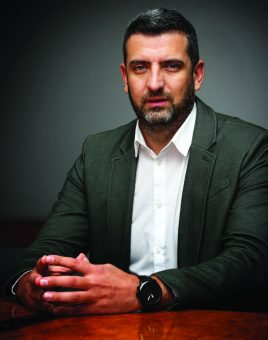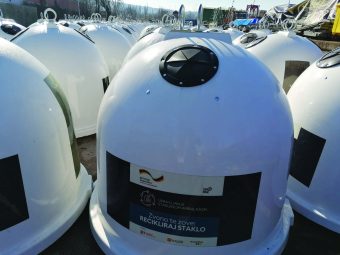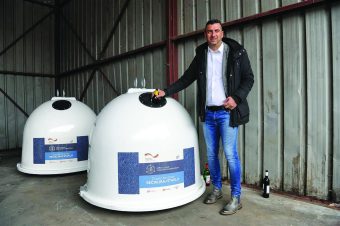
All NALED projects aim to pilot modern solutions and provide reliable insight into how the management of food, packaging and hazardous waste flows would look if the related solution were to be systematically adopted and implemented throughout the country.
In collaboration with the Serbian government and line institutions, The National Alliance for Local Economic Development (NALED) participates in the working groups working on amending regulations, especially the amendment to the Law on Packaging Waste. In cooperation with the business sector, NALED prepares analyses that justify implementing a deposit system for packaging returns. They also supported the development of the Circular Economy Development Programme and implementing measures stated in the relevant Action Plan.
They hired the renowned British company Eunomia to research the continuation of waste collection in Serbia. Two studies were made on the back of the results of collection based on the existing ‘polluter pays’ principle, as well as on the goals that would be achieved if a deposit system were implemented, which is a method of returning packaging to stores and getting a partial refund for the money paid when purchasing the product. The analyses were done on a neutral basis to arrive at solutions that are best for the overall country, not individuals.
We spoke with Slobodan Krstović, the Sustainable Development Director at NALED, about improving the environment for further developing the green economy in Serbia, European regulations, measures for proper waste disposal and plans for improving environmental protection.
IN FOCUS:
- THE HIGH COST OF CHEAP FASHION
- WHERE TO RECYCLE MAP SOLVES THE DOUBTS OF CITIZENS AND COMPANIES ABOUT RECYCLING
- PAPER PRODUCTION WITH SOCIALLY AND ENVIRONMENTALLY RESPONSIBLE BUSINESS
EP: What are the key steps for making significant progress towards a healthier environment in our country?

Slobodan Krstović: In terms of waste management, it is important to continue developing primary selection and constructing regional landfills where waste would be properly stored, but also implementing new technologies such as a deposit system, which would motivate people to care more about recycling. It is also necessary to continue with the construction of the sewage grid and waste treatment plants because, for the past several years, less than 10 per cent of wastewater in Serbia has been treated, while the largest cities such as Belgrade, Niš, and Novi Sad do not have a single waste treatment plant. Communal and industrial wastewater is discharged directly into rivers. If we want cleaner air, we need to replace coal with other energy sources and invest in cleaner technological solutions in the industry and at home, which are all the basis for a healthier future. One of the measures that NALED advocates is higher fees for large polluters because the current fee calculation system does not motivate them to reduce the number of pollution particles they emit.
EP: What are the possibilities for establishing a functional Green Fund in Serbia as an important instrument for financing environmental projects?
Slobodan Krstović: NALED recognizes the importance of forming the Green Fund to ensure the transparency and sustainability of financing environmental protection projects. The new edition of the Gray Book again recommends an operational Green Fund be established, as a completely functional body that will serve projects oriented towards environmental protection, with a clearly defined legal framework and budget. Efforts are also being made to boost the capacity of public administration in matters pertaining to the environment at both the local and national levels and to change pollution fees.
EP: What should be done to raise the awareness of both companies and individuals about the importance of proper waste disposal in Serbia?

Slobodan Krstović: Companies should be able to make proper waste disposal more profitable than simply taking it to landfills. It can be done by higher fees for this service and having certain incentives. Individuals should be assured that the state and local governments are implementing all required environmental measures so that they develop better habits. If people see that waste is properly collected and treated, they will be motivated to separate household waste. Special containers must be more accessible, and there should be significantly more near every residential building or house. In the research carried out under the auspices of the “Management of Glass Packaging in the Western Balkans” project, the research participants said that having incentives in the form of discounts on the next purchase or on utility bills, as well as being entitled to refunds when taking packaging back to shops, would motivate them to start sorting waste.
EP: What waste management projects has NALED launched with partners in an attempt to find systemic solutions to this problem? What results have you achieved?
Slobodan Krstović: Our projects have focused on managing food waste, batteries, light bulbs, and glass packaging. The piloting of a smart packaging waste collection system in Zrenjanin using the latest technologies is currently underway. In this way, we collected more than 1,300 tonnes of food waste and installed 1,400 recycling containers for glass packaging in Serbia and the region. We started collecting hazardous waste at public locations in our country for the first time in our country, Kragujevac and Belgrade.
These are the small steps we have taken to indicate the required systemic solutions in these areas, which must be adopted at the institutional level. Waste disposal fees need to be higher to make it more profitable to send packaging waste for recycling rather than ship it to landfills. Incentives should be provided for establishing a collection system and exporting batteries and light bulbs because building a recycling plant is unprofitable at this time. Proper collection and storage of a kilogramme of batteries currently cost 4 euros. The solution we proposed for regulating special waste flows under the auspices of the Proper Management of Food Waste project is that all catering establishments that serve more than 50 meals a day have to separate waste properly. In cooperation with the EsoTron Company and with the support of the German Development Cooperation (GIZ) organization, we have created a Guide containing precise instructions which can facilitate this practice.
Interviewed by: Mirjana Vujadinović Tomevski
Read the story in the new issue of the Energy portal Magazine ENVIRONMENTAL PROTECTION
